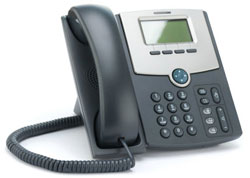IP Phones for the Small Business: A Cost Analysis

IP (internet protocol) phones are telephones that are made to work specifically with a VoIP (voice over internet protocol) network. VoIP systems take analog telephone audio and transmits it over the internet. VoIP systems require a high-speed broadband internet connection. The more users you have, the more bandwidth you will need for your IP phone system.
IP phones look the same as traditional telephones. They have all the same major pieces and functions, but rather than connecting to a phone jack, they use an Ethernet connection. If you’re considering changing your small business from digital lines to VoIP, you’ll have to be sure you have the correct phones and the proper data infrastructure to be able to support the network.
IP Phone System Costs
The cost of an IP phone system depends upon your business needs, your hardware, your infrastructure, your users, and a several other variables. Let’s take a look at examples of low, mid, and high-level service costs, and examine the cost of some popular IP phones.
Basic Service
Basic level services typically work through the cloud, so the IP phones required for this service are simple, and users can even convert analog phones with an adapter. Basic service is available for single users to over 100 users. Standard service is about $25 per month per user and premium service averages about $50 per month per user. These plans may or may not provide unlimited calling, voicemail, and other basic features for business.
Mid-Level Service
Services at the mid-range are more expensive than basic plans, but typically offers more features like access to 911 Emergency services and features like voice mailboxes for all users, unlimited calling, virtual receptionists, and mobile apps. Mid-level services can range from $40 per month per user to over $75 per month per user.
Advanced Service
For the technologically-inclined, a self-hosted VoIP system may be in the cards. These self-hosted systems offer the best level of security and service, but at a premium price. The up-front costs of dealing with a self-hosted service can climb into the thousands of dollars, depending upon your existing infrastructure and the system you choose to purchase. Monthly costs can range from $50 per user to close to $100. Additionally, the IP phones required of these services are a bit more expensive.
IP Phone Cost Sampling
There are literally thousands of IP phones on the market and they range in price from around $100 for standard phones to over $500 for conference lines. Here is a sampling of some of the more popular brands:
Aastra 6731i
This is a standard six-line phone without many bells and whistles. Caller ID, Three-way conference, speaker, and speed dial are standard features of this model. It retails for around $100 per phone.
Polycom SoundPoint Pro SE-220
The main feature of this IP phone is its advanced speaker phone option. Polycom claims this model cuts the choppiness of typical speaker phone conversations. It also has a 99-number call history memory, 20 programmable speed dial options and caller ID. This model retails from $150 to $200 per unit.
Cisco Unified IP Phone 7962G
This phone is a 6-line desktop model with an LCD screen displaying time, date, and caller ID. The phone comes with an Ethernet port, build-in voicemail options, speakerphone, and remote headset connection. This phone can be used in 30 languages and is compatible with hearing aids. Users report good sound quality, but this phone cannot be adapted for an analog system or PBX system. This model retails from $169 to $240 each.
Cisco Unified 7937 IP Conference Station - CP-7937G
This is a state-of-the-art conference phone with multiple advanced features. It integrates with virtually all media and operating systems. It offers excellent sound quality and despite its futuristic appearance and multiple calling and media features, is very user friendly. This conference phone retails for around $500 per unit.
The cost of IP phones and VoIP systems can vary greatly. When you combine the cost of implementing the proper infrastructure, installing the necessary routers and hardware, and the cost of each individual phone, the price can suddenly climb higher than many small businesses initially anticipated. It is also critical to purchase the proper phone for your system. Not all IP phones are compatible with each service type, so small business owners will have to have a firm understanding of their system before purchasing individual IP phones.
Other IP Phone Considerations

Cost isn’t the only consideration when it comes to your organization’s phone system. It is important for small business to understand a few key things about IP phones before committing to a VIOP service.
- The VOIP system will have to be installed. Before you can use an IP phone system, technicians will have to visit your office location to test your connections to ensure you have enough power and data speed to support the system. If you do not, you’ll have to first upgrade your power and high-speed internet connection. Once you’ve upgraded your system, you’ll still have to purchase and install special routers and equipment from your vendor in order to make the connection work.
- The phones run on AC power. IP phones typically run on AC Power. Which means a power surge or power outage will result in your phone lines going down.
- Internet outages are common.If you’re internet provider is prone to going down several times a year, be prepared for your phone lines to go down as well. You can pay your provider an extra fee to route your calls to a prerecorded message, but it still means a disruption to your business. And even slight interruptions in the Ethernet stream can cause the phones to function improperly.
- Your server might not be on-site.The server for your phone system will typically be located somewhere else. So if there is a disruption in the connection, you can’t even make internal calls to team members located across the room. If your server is located on-site, your IT team will have to be trained on how to perform system maintenance.
- Data security is a concern. If you choose an IP phone system, you’re using computer data lines. With any computer system, security is an issue. And like any computer system your phones will be vulnerable to viruses, Trojans, malware, spamming, and hackers regardless of your provider. Even Cisco, a company known for taking online security very seriously has had issues with vulnerable IP phones.
- Monthly operational costs. Once you’ve upgraded your connection and installed the phones, you’ll still have to pay monthly operational fees to your provider. These fees often do not cover training, maintenance, or upgrades, so as your business expands you’ll have to pay even more to modify your system.
- No emergency services. Most basic VoIP providers don’t offer 911 services, but rather charge an extra fee if someone dials for emergency assistance.
- IP phone feature vary greatly. Features of a phone system are not based on the technology of internet protocol. The features depend upon the manufacturer. And as with any piece of office equipment, the more features you choose, the more you will pay. It’s also important to note that IP phone manufacturers are often companies that until recently, made only computer data equipment, leaving their phones without logical features that a telephone company would include as standard options. For example, the outside-line dial tone sound may be the same as the intercom dial tone, which can lead to many confusing situations.
At the end of the day, VoIP systems are just a reinvention of the wheel. They are computer systems that mimic (and often overcomplicate) telephone systems. But when it comes to technology for small business there is rarely an easy solution and there is never a “one size fits all’ solution. IP phones may be seem attractive, but a thorough cost-benefit analysis will be critical to determine whether the economics of an IP phone system align with your business goals. For many small businesses, traditional phone systems coupled with internet-based call routing and systems are the most economical and reliable choice.